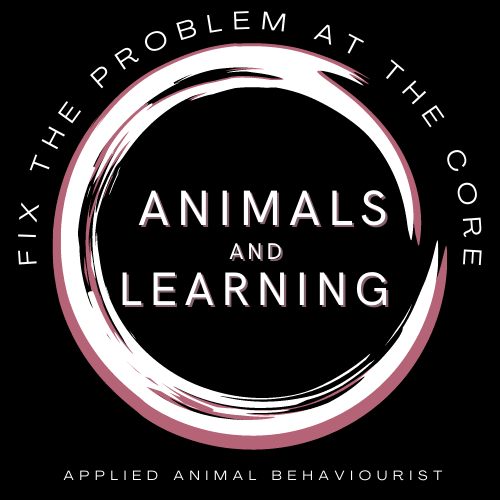
It can be hard to know who to approach when your dog is having issues. Commonly, you may think a dog trainer, but this might actually not be the person you do need to see! It could be you need a behaviourist instead.
Trainers will teach your dog to do things, and sometimes not to do things. Usually, they have an in-depth understanding of learning in animals. Some trainers may help with less complex behavioural issues, but often do not. They are more likely to do things like puppy classes and teaching dogs basic commands, like sit, stay, come. A good trainer should have a large amount of experience, and sometimes a Bachelor of Science degree (BSc) in animal behaviour, welfare or science. They may be accredited by an association for dog training (their knowledge has been assessed) to show they are trustworthy.
Behaviourists are slightly different. They also understand the learning process, but their approach is psychology based. They should tackle the root-cause (usually anxiety, or impulse control) of a problem behaviour to then replace it, rather than simply train new behaviours.
There are two types of behaviourists: applied animal behaviourists (AABs), which you can think of as psychologists and then clinical animal behaviourists (CABs) which are more like psychiatrists. Often, CABs are vets who have specialised in behaviour and can prescribe medication. Usually, their qualifications have taken a veterinary route with behavioural elements, but in some cases, a behaviourist route with a specialisation in clinical elements. AABs on the other hand, usually have a Masters of Science (MSc) or PhD, and work on a purely psychological basis. In other words, they don’t prescribe medication but may dabble in natural remedies. Behaviours can also be accredited but by slightly different boards to trainers. Therefore, because of the knowledge required, behaviourists typically have higher and more qualifications than a trainer, and can fix more complex behavioural issues.
CABs are more common, purely because of how the structure of animal qualifications have developed, but also, for a similar amount of time and effort, they get paid much more! CABs are also vet referral only, you cannot just self-refer, but you can with AABs. Despite this, the methods the two types of behaviourists use will be the same!
Good behaviourists identify the root-cause and work in a positive way. Replacing bad behaviours with positive ones. They won’t use fear methods such as pong and electric collars, which worsens bad behaviour long-term as it often feeds the issues. You can’t fix fear with fear, you just suppress it until it becomes dangerous. Balanced trainers and behaviourists may dabble with these methods but it is not their sole focus. In my opinion, balanced trainers/behaviourists should be avoided! We know enough about animal behaviour to be able to know how to positively work through it—yes it takes more time, but it is more beneficial.
It can be difficult to tell who you need, but the short of it all is that you need a trainer for new, basic training and applied/clinical animal behaviourist for behavioural correction and changing problem behaviours.
If you do not feel your dog needs intensive medication, try an applied animal behaviourist. They’re cheaper and very knowledgeable, but if natural remedies and the methods alone do not work, you may need to see a CAB anyway! If your dog has extreme aggression and anxiety, this may be a job for a CAB to prescribe medication for the methods to work when training. You can read about energy levels and how it affects a dog’s training
here.Trainers are usually cheaper than applied behaviourists, applied behaviourist are usually cheaper than clinical behaviourist and clinical behaviours are usually the most expensive, purely because they can only take vet referral cases. However, in our field, qualifications and accreditation is not a requirement as there is no regulation around dog trainers and behaviourist. So, anyone can call themselves a dog professional. You should always check to make sure your trainers have experience, reviews, and where possible the qualifications, and/or accreditation.
We are applied animal behaviours here at animals and learning. We can train basic behaviours, and we do, but we specialise in behavioural correction without medication or with the use of natural remedies. If an animal does need medication, we can aid in clinical referral. We’re currently exploring accreditation. Do not hesitate to contact us now— we offer online courses and consultation, and in person to those local.



